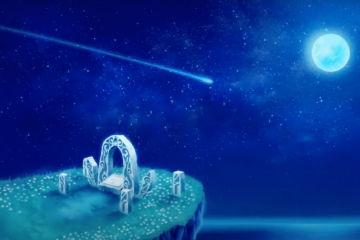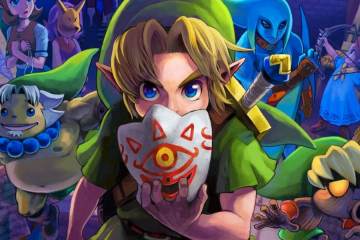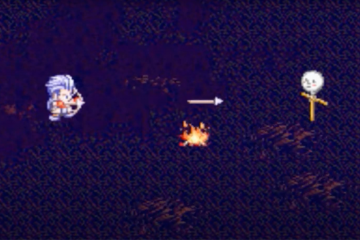Even though many role-playing games (RPGs) are not American in origin, the genre often represents a playable version of the American Dream: the player often assumes the role of a well-meaning but untrained youth, who matures through effort and experience into a wiser individual respected by all. Even as Americans question the likelihood of the American Dream in modern-day America, such “rags-to-riches” stories remain a dominant force in role-playing games. In series like Pokémon, every game escorts the player through such an “American dream,” as the player’s avatar rises from an unknown ten-year-old to a wealthy and internationally adored celebrity through nothing but talent and determination.
The Pokémon world functions as a pure meritocracy, wherein the individuals who perform best rise to the top. Although seemingly ideal in the abstract, I argue in this essay that the Pokémon world is no less dysfunctional than our own. I’ll first think about what exactly “merit” means to the NPC’s of this world, and what assumptions NPCs make about Trainers with “merit.” I’ll then go beyond the story to consider how some of Pokémon’s more intricate battle mechanics reinforce the idea of the best going to the top and the rest stagnating.
The Pokémon world’s method of determining who has merit is no better than real-world systems. If modern society’s ills originate from political factors that allow people to succeed without merit, Pokémon’s problems result from an extreme laser-focused view of merit—specifically, one’s performance in Pokémon battles. Merit is a trainer’s demonstrated strength at a given time, not the potential they might have to be strong in a different circumstance. If you think someone’s performance at a certain time consistently predicts their performance in other circumstances, a meritocratic system will only increase the divide between the successful and unsuccessful. This is a flaw shared, at least in part, by our world. Even if we can’t use Pokémon as a way to envision a better society, we can at least use it to elucidate some of our problems.
Inferring Kindness from Greatness: Pokémon’s Moral Fallacy
The only trait the player can actively demonstrate in the Pokémon games is battling prowess, but these games tend to have plots that evoke larger themes of morality and emotional engagement. The avatar serves as the means by which the player can interface with the game world, but has no personality of its own. Therefore, much of the game’s dialogue can be seen as an address to the player, rather than the in-game avatar. The congratulatory messages received from the avatar’s mentors at the end of the games are therefore meant much more for the player than the avatar. The player will unquestioningly be praised for kindness, strength, and courage, no matter how they played the game. Upon defeating the rival at the end of Pokémon Red and Blue, Professor Oak exclaims that the avatar has “come of age!” He then turns to the avatar’s rival and asks, “ do you understand why you lost? You have forgotten to treat your Pokémon with trust and love. Without them, you will never be a champ again.”
This valedictory comes after a game’s worth of chances for the player to neglect, hurt, and humiliate their Pokémon. In this first generation of Pokémon games, the player had no way to evaluate the emotional status of their Pokémon, so the player has no specific evidence with which to validate or contradict Oak’s praise. However, in the remakes of the original games (FireRed and LeafGreen), each Pokémon has an individual happiness value that will fluctuate based on the player’s treatment of the Pokémon. Even then, Oak will praise you after the final victory, despite the possibility of the player using a team of explicitly miserable Pokémon. Every NPC in this world defines merit in the same way that Oak does, so becoming the champion of Pokémon battles is tantamount to sainthood in the eyes of the in-game populace. In every playthrough, the mindset of the NPCs is reliably along these lines. The avatar’s mindset and behavior cannot be determined in advance, however, because the avatar might be guided by any kind of player. Since there could be so many kinds of players going through the game—treating their Pokémon well, badly, or indifferently—winning the game does not indicate how the player behaved along the way. And yet, Professor Oak believes that the player behaved virtuously, even if this wasn’t what actually happened.
This is the fundamental principle of the respect given to the player by characters like Professor Oak: taking skill in Pokémon battling as a stand-in for other positive traits. Real-life sports fans are willing to recognize real-world athletes as petty or unlikeable off the field, even if they have an exceptional win record; if our world were instead like the Pokémon world, we would unquestioningly view high-performing athletes as flawless in every regard, just in virtue of their high sports performance.
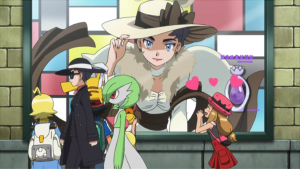
Diantha from Pokémon X and Y is both the League Champion and a famous movie star, leading to a great deal of admiration from Trainers and non-Trainers alike.
Born to Succeed: Pokémon Breeding as Meritocracy
The core belief of the games’ political system—that one can tell everything about the value of someone else based on only one moment—is more than a way to simplify the plot: it applies to the fundamental nature of the Pokémon themselves. Although it is never explicitly explained to the player, Pokémon have attributes called IVs that act as their genetics. The player eventually gains the ability to see the genetic strengths and weaknesses a specific Pokémon displays, and, based off of this, can choose which newly bred Pokémon to train and which to abandon.
The player can usually complete the story and become the champion without delving into this genetic manipulation, but the post-game content and real-world competitive scene expect the player to invest themselves in said genetic monitoring. Players who choose to go beyond the game’s final boss will encounter fierce NPCs with optimized teams in the “postgame”; and, if the player cares enough, they may even face fierce human opponents in the real-life Pokémon World Championships. In such contexts, optimization of IVs is mandatory, rather than an optional diversion. To have a viable team at the highest levels of play, the player must make a snap judgment about their Pokémon’s genetic material, in a way that will let the strongest Pokémon rise to the top while others languish in obscurity. In a technical sense this is logical, as the worthiness of the Pokémon is expressed through numerical values. In regard to the story of the game world, though, this is quite jarring: would a player who loved their Pokémon immediately reject a newborn baby Pokémon because it was weak? Similarly, if a Pokémon required a maximum happiness stat to evolve into a stronger form, would the player make the Pokémon happy just for the sake of getting to the stronger form, rather than out of a desire to make the Pokémon happy?
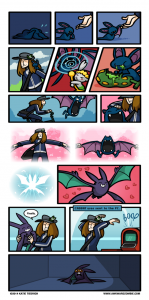
The player only wants to “catch them all,” evolving the Pokémon for nothing more than recording the existence of its final form. Once the Pokémon is catalogued, the player has no further use for it.
Cycles of Success and Failure: The Player as Beneficiary of the Meritocratic System
For aspiring Pokémon League Champions, the reward for being strong at a particular point in time is the opportunity to become even stronger later on. As the player earns more Gym Badges, they command more and more respect from the people around them. This lets them fight stronger foes, earning more money from battles, easily purchasing healing and stat-improving items for their Pokémon, and using them to become even stronger. Someone’s success or failure therefore depends strongly on whether their journey begins on an upbeat note or a downbeat one. Even before receiving a Pokémon, the avatar has usually gained the support of an elite academic, a Pokédex to consolidate and organize knowledge, and a petty childhood rivalry that serves as motivation for the player to assemble a strong Pokémon team.
Good performance at the start of a quest will earn the attention of important authorities and high-ranking League members. Poor performance will lead Trainers to be ignored by others, sink lower in society, and ultimately become worthless to those at the top. In the games, this sadder path is represented by the people whom the player and avatar challenge to battles on routes between cities. For the player, the only purpose of these characters is to provide a source of money and experience points. In two ways, these NPCs are stuck in a situation that leaves them no choice but to serve as fodder for the player. First, the NPCs are stuck in the context of the game world, because they content themselves with fishing or bug-catching for their entire lives. Second, they are also stuck as fodder is also true in a literal sense, because their programming provides them no other option than to stand, immobile, waiting for the player to arrive and battle them.
A New Generation: Sun and Moon, Guzma, and the Possibility of Change
In the earlier Pokémon generations, the flawed political system was sequestered in the background of the game world. One could easily complete the story of Red and Blue without ever considering the topics of this essay. On the other hand, in the newest series entries, Pokémon Sun and Moon, the player must confront the agony of failure in a meritocracy in order to complete the story. The villainous Team Skull is composed of young delinquents unable to gain a foothold in society, and who are now dedicated to disrupting society in whatever ways they can. Team Skull as a whole seems to question whether the game’s political system is worth emulating. Despite this, however, the story arc of Team Skull’s leader, Guzma, ends up praising the meritocracy instead.
Team Skull’s leader, Guzma, is a twentysomething miscreant who watches over the (admittedly incompetent) Team Skull. Dialogue sequences in Guzma’s childhood home suggest that Guzma was physically abused as a child, and rejected from a highly coveted Trial Captain position soon after. At the time of Sun and Moon’s story, he has finally found his strength; players are often taken aback by the strength of Guzma’s partner Pokémon, far greater than anything produced by the lowly Team Skull Grunts. As it turns out, there was a reason why Guzma could become stronger: Team Skull is eventually revealed to have been receiving payoffs from the Aether Foundation, a wealthy and sinister organization that deploys Team Skull as a diversionary tactic.
Guzma perfectly embodies the perils of the Pokémon world’s political structure: he is a late bloomer who always had potential to perform well, but who did not have demonstrable strength in battle. Given that performance is much more visible than potential in Pokémon battles, Guzma’s untapped potential was essentially worthless for him. Even though the game’s portrayal of the character is largely sympathetic, the plot ultimately sides with society, rather than Guzma: after the ending of the game, Guzma can be found training with a well-respected island elder, resolving to become stronger. This shows us that Guzma ultimately tries to satisfy the meritocratic expectations of his society, rather than defying them.
No matter how much the game might make the player feel sorry for Guzma, Guzma simply cannot win. If he were to emerge triumphant against the player and society, the gaming experience would collapse. The game’s plot will not allow the player to advance until the player defeats Guzma, and dialogue won’t change to account for the fact you lost to him, no matter how many times you lose. Failure simply is not an option for the player, as the avatar is destined to become a champion. The world the player explores exists entirely for them to conquer; even though Sun and Moon’s bustling cities suggest busy lives independent of the player’s intervention, everything is meant to be seen, taken, or defeated by the player. Everyone and everything in the game exist to help the player ascend in the meritocratic system, allowing the player’s invested time to be rewarded with amplified strength. By necessity, Guzma’s needs as an individual are outweighed by the need for the avatar and player to emerge as Pokémon champions by the end of the story. In this context, the tidy resolution of Guzma’s story arc becomes rather sinister. Guzma’s acquaintances are well aware of the social problems that exist in their world, and yet these acquaintances function only in relation to the player, rather than Guzma. If a new governmental system stressing egalitarianism were to take over Pokémon’s society, the player would no longer be able to rely on being upwardly mobile. This would not allow a story of the player’s ultimate, guaranteed triumph and hence it is unlikely that Pokémon will ever call out its political flaws by fixing them.
Money Can’t Buy Everything: Wealth Vs. Status in the Pokémon World
Guzma’s improvement after receiving the payoffs might imply that wealth is the key to success in his world. As is the case in our world, the truth is that money can be used to ascend in a meritocracy, but can just as easily be misused to lose high social standing. A case-in-point is Team Flare, Pokémon X and Pokémon Y’s villainous organization. As part of an apocalypse cult guided by a technology magnate, Team Flare members must pay exorbitant amounts to their organization in order to ensure their own safety in the upcoming apocalypse (of their own making). Excessively materialistic and prone to poor decisions, the Team Flare members misuse their money and end up plummeting towards the bottom of the Pokémon world’s meritocratic structure, despite having untold sums of money at their disposal.

No matter how much their outfits cost, Team Flare Grunts are still incompetent Trainers.
A Link to the Future: Questioning Meritocracy as Model for Real-World College Admissions
Not every rich person is part of Team Flare, and some people find ways to use their money to improve their performance, essentially buying merit. This is a concern both in Pokémon’s world, where the player’s ability to buy hundreds of healing items is never taken as a “crutch” aiding their overall performance, and in ours, where tutoring and prep-books help us improve test performance. Colleges across the United States are debating whether life circumstances should be taken into account when admitting new students. In this sort of model, life situations that could hinder performance as a child (e.g., health problems, working a job in high school) compensate for decreased test scores, grades, and extracurricular commitment. A counter-argument to this model is that such a student has not demonstrated the ability to succeed in a high-intensity academic environment. This logic can result in people being closed out of the educational system on the grounds that they should not reach an advanced stage before mastering an elementary stage. If the elementary stage cannot be surpassed and the person has no one to turn to, there is little that can be done. This logic is already applied in Pokémon: the Youngsters and Ace Trainers on the routes between cities fail to beat the player, which encourages the player to walk away without a tinge of regret, as the fallen opponent doesn’t seem to have deserved a chance at success. This prevents everyone who fails to “start strong” from improving; it only allows people who start strong to get stronger.
Such is the case for Guzma and many of the generic Trainers the player encounters: having faltered, they now stand by the side of the roads, battling the player and giving up money, so these NPCs become even more destitute. We never experience these hardships as players because our avatar grants us access to a cornucopia of valuable resources: a Pokédex, the mentorship of a professor, and a powerful starter Pokémon. Pokémon’s world is built for the player’s enjoyment, and therefore this cornucopia must be given to the player. To ask a human player to politically campaign for NPCs in games is unreasonable; however, given the similarities to our world, perhaps we can think about what we can do in a world where every character is a human player.

